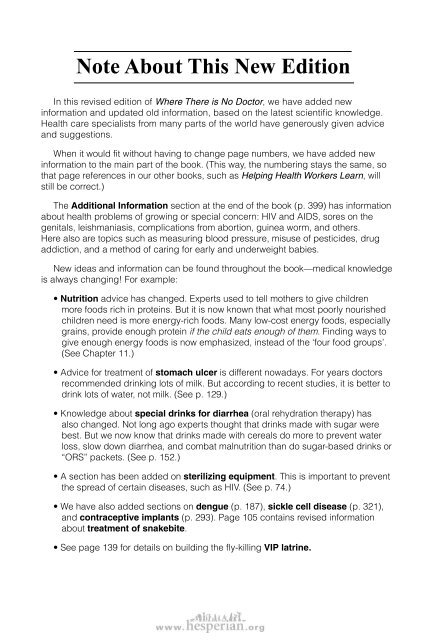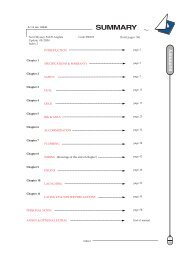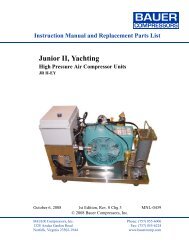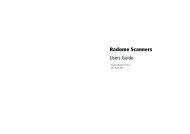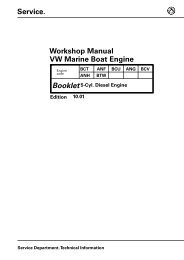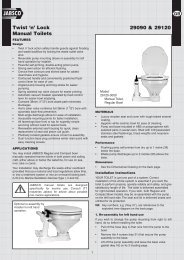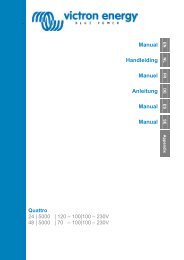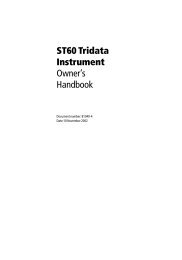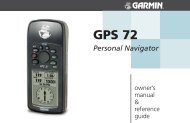- Page 1 and 2: Where There Is No Doctor 2010
- Page 3 and 4: Thanks to the work and dedication o
- Page 5 and 6: Contents A list of what is discusse
- Page 7 and 8: Chapter 10 FIRST AID . . . . . . .
- Page 9 and 10: Chapter 16 THE EYES . . . . . . . .
- Page 11 and 12: Chapter 22 HEALTH AND SICKNESSES OF
- Page 13: The first English edition was the r
- Page 17 and 18: Where There Is No Doctor 2010 Dear
- Page 19 and 20: Where There Is No Doctor 2010 4. KN
- Page 21 and 22: Where There Is No Doctor 2010 8. LO
- Page 23 and 24: Where There Is No Doctor 2010 TAKE
- Page 25 and 26: Where There Is No Doctor 2010 Sampl
- Page 27 and 28: Where There Is No Doctor 2010 USING
- Page 29 and 30: Where There Is No Doctor 2010 MORE
- Page 31 and 32: Where There Is No Doctor 2010 WORKI
- Page 33 and 34: Where There Is No Doctor 2010 SENSI
- Page 35 and 36: Where There Is No Doctor 2010 FINDI
- Page 37 and 38: Where There Is No Doctor 2010 Tools
- Page 39 and 40: Where There Is No Doctor 2010 Worki
- Page 41 and 42: Where There Is No Doctor 2010 USE P
- Page 43 and 44: Where There Is No Doctor 2010 MAKIN
- Page 47 and 48: NOTICE This book is to help people
- Page 49 and 50: 2 Where There Is No Doctor 2010 Old
- Page 51 and 52: 4 Where There Is No Doctor 2010 BEL
- Page 53 and 54: 6 Where There Is No Doctor 2010 QUE
- Page 55 and 56: 8 Where There Is No Doctor 2010 Is
- Page 57 and 58: 10 Where There Is No Doctor 2010 WA
- Page 59 and 60: 12 Where There Is No Doctor 2010 ME
- Page 61 and 62: 14 Where There Is No Doctor 2010 HO
- Page 63 and 64: 16 Where There Is No Doctor 2010 Pu
- Page 65 and 66:
18 Where There Is No Doctor 2010 DI
- Page 67 and 68:
20 Where There Is No Doctor 2010 SI
- Page 69 and 70:
22 Where There Is No Doctor 2010 EX
- Page 71 and 72:
24 Where There Is No Doctor 2010 Sp
- Page 73 and 74:
26 Where There Is No Doctor 2010 CO
- Page 76 and 77:
29 How To Examine a Sick Person CHA
- Page 78 and 79:
How to Use a Thermometer Where Ther
- Page 80 and 81:
Where There Is No Doctor 2010 33 Th
- Page 82 and 83:
THE BELLY (ABDOMEN) Where There Is
- Page 84 and 85:
MUSCLES AND NERVES Where There Is N
- Page 86 and 87:
39 How to Take Care of a Sick Perso
- Page 88 and 89:
2. Food If the person is too sick t
- Page 90 and 91:
Where There Is No Doctor 2010 WHEN
- Page 92 and 93:
45 Healing Without Medicines CHAPTE
- Page 94 and 95:
Where There Is No Doctor 2010 47 Ti
- Page 96 and 97:
49 Right and Wrong Uses of Modern M
- Page 98 and 99:
Where There Is No Doctor 2010 51 6.
- Page 100 and 101:
Where There Is No Doctor 2010 53 13
- Page 102 and 103:
Antibiotics: What They Are and How
- Page 104 and 105:
Where There Is No Doctor 2010 57 7.
- Page 106 and 107:
59 How to Measure and Give Medicine
- Page 108 and 109:
Where There Is No Doctor 2010 61 ME
- Page 110 and 111:
Where There Is No Doctor 2010 63 HO
- Page 112 and 113:
65 Instructions and Precautions for
- Page 114 and 115:
Where There Is No Doctor 2010 67 WH
- Page 116 and 117:
Where There Is No Doctor 2010 69 Th
- Page 118 and 119:
Where There Is No Doctor 2010 71 Ho
- Page 120 and 121:
Where There Is No Doctor 2010 73 WH
- Page 122 and 123:
75 First Aid BASIC CLEANLINESS AND
- Page 124 and 125:
Where There Is No Doctor 2010 77 SH
- Page 126 and 127:
Where There Is No Doctor 2010 79 WH
- Page 128 and 129:
Where There Is No Doctor 2010 81 EM
- Page 130 and 131:
Where There Is No Doctor 2010 83 HO
- Page 132 and 133:
Where There Is No Doctor 2010 85 LA
- Page 134 and 135:
Where There Is No Doctor 2010 87 BA
- Page 136 and 137:
Where There Is No Doctor 2010 89 WO
- Page 138 and 139:
Where There Is No Doctor 2010 91 Wh
- Page 140 and 141:
Where There Is No Doctor 2010 93 ME
- Page 142 and 143:
Where There Is No Doctor 2010 95 Si
- Page 144 and 145:
Where There Is No Doctor 2010 97 Sp
- Page 146 and 147:
Where There Is No Doctor 2010 99 BR
- Page 148 and 149:
Where There Is No Doctor 2010 101 D
- Page 150 and 151:
Where There Is No Doctor 2010 103 P
- Page 152 and 153:
Treatment for poisonous snakebite:
- Page 154 and 155:
Nutrition: What to Eat to Be Health
- Page 156 and 157:
WHY IT IS IMPORTANT TO EAT RIGHT Wh
- Page 158 and 159:
EATING RIGHT TO STAY HEALTHY Where
- Page 160 and 161:
WET MALNUTRITION—OR KWASHIORKOR W
- Page 162 and 163:
WAYS OF EATING BETTER WHEN YOU DO N
- Page 164 and 165:
4. Beans, peas, lentils, and other
- Page 166 and 167:
THINGS TO AVOID IN OUR DIET Where T
- Page 168 and 169:
Where There Is No Doctor 2010 121 F
- Page 170 and 171:
HARMFUL IDEAS ABOUT DIET Where Ther
- Page 172 and 173:
Where There Is No Doctor 2010 125 R
- Page 174 and 175:
Where There Is No Doctor 2010 127 D
- Page 176 and 177:
♦ Drink a lot of water. Try to dr
- Page 178 and 179:
131 Prevention: How to Avoid Many S
- Page 180 and 181:
Where There Is No Doctor 2010 133 M
- Page 182 and 183:
CLEANLINESS IN EATING AND DRINKING
- Page 184 and 185:
Where There Is No Doctor 2010 137 P
- Page 186 and 187:
Where There Is No Doctor 2010 139 T
- Page 188 and 189:
Where There Is No Doctor 2010 141 P
- Page 190 and 191:
Where There Is No Doctor 2010 143 T
- Page 192 and 193:
Typical amebic dysentery consists o
- Page 194 and 195:
Where There Is No Doctor 2010 147 V
- Page 196 and 197:
Where There Is No Doctor 2010 149 H
- Page 198 and 199:
151 Some Very Common Sicknesses DEH
- Page 200 and 201:
Where There Is No Doctor 2010 153 D
- Page 202 and 203:
Treatment of diarrhea: Where There
- Page 204 and 205:
Special treatment in different case
- Page 206 and 207:
Where There Is No Doctor 2010 159 C
- Page 208 and 209:
Where There Is No Doctor 2010 161 V
- Page 210 and 211:
Where There Is No Doctor 2010 163 C
- Page 212 and 213:
Where There Is No Doctor 2010 165 S
- Page 214 and 215:
ASTHMA A person with asthma has fit
- Page 216 and 217:
Where There Is No Doctor 2010 169 2
- Page 218 and 219:
Where There Is No Doctor 2010 171 P
- Page 220 and 221:
ARTHRITIS (PAINFUL, INFLAMED JOINTS
- Page 222 and 223:
Where There Is No Doctor 2010 175 V
- Page 224 and 225:
Where There Is No Doctor 2010 177 H
- Page 226 and 227:
179 Serious Illnesses That Need Spe
- Page 228 and 229:
Where There Is No Doctor 2010 181 R
- Page 230 and 231:
Where There Is No Doctor 2010 183 S
- Page 232 and 233:
Where There Is No Doctor 2010 185 M
- Page 234 and 235:
Where There Is No Doctor 2010 187 H
- Page 236 and 237:
Where There Is No Doctor 2010 189 S
- Page 238 and 239:
Where There Is No Doctor 2010 191 L
- Page 240 and 241:
193 Skin Problems CHAPTER 15 Some s
- Page 242 and 243:
Where There Is No Doctor 2010 195 R
- Page 244 and 245:
Where There Is No Doctor 2010 197 A
- Page 246 and 247:
Where There Is No Doctor 2010 199 S
- Page 248 and 249:
Where There Is No Doctor 2010 201 T
- Page 250 and 251:
Where There Is No Doctor 2010 203 T
- Page 252 and 253:
Where There Is No Doctor 2010 205 F
- Page 254 and 255:
Where There Is No Doctor 2010 207 V
- Page 256 and 257:
Where There Is No Doctor 2010 209 B
- Page 258 and 259:
Where There Is No Doctor 2010 211 P
- Page 260 and 261:
Where There Is No Doctor 2010 213 G
- Page 262 and 263:
Where There Is No Doctor 2010 215 S
- Page 264 and 265:
217 The Eyes CHAPTER 16 tear gland
- Page 266 and 267:
CHEMICAL BURNS OF THE EYE Battery a
- Page 268 and 269:
INFECTED EYES IN NEWBORN BABIES (NE
- Page 270 and 271:
Where There Is No Doctor 2010 223 I
- Page 272 and 273:
BLEEDING IN THE WHITE OF THE EYE A
- Page 274 and 275:
Where There Is No Doctor 2010 227
- Page 276 and 277:
229 The Teeth, Gums, and Mouth CHAP
- Page 278 and 279:
Where There Is No Doctor 2010 231 T
- Page 280 and 281:
233 The Urinary System and the Geni
- Page 282 and 283:
Where There Is No Doctor 2010 235 M
- Page 284 and 285:
Where There Is No Doctor 2010 237 I
- Page 286 and 287:
Where There Is No Doctor 2010 239 H
- Page 288 and 289:
Where There Is No Doctor 2010 241 P
- Page 290 and 291:
Pain or Discomfort in the Lower Cen
- Page 292 and 293:
245 Information for Mothers and Mid
- Page 294 and 295:
Where There Is No Doctor 2010 247 P
- Page 296 and 297:
Where There Is No Doctor 2010 249 D
- Page 298 and 299:
3. Minor problems Where There Is No
- Page 300 and 301:
RECORD OF PRENATAL CARE 1 MONTH DAT
- Page 302 and 303:
Where There Is No Doctor 2010 255 A
- Page 304 and 305:
Checking if the Baby Is in a Good P
- Page 306 and 307:
Where There Is No Doctor 2010 259 T
- Page 308 and 309:
Normally the baby is born head firs
- Page 310 and 311:
Where There Is No Doctor 2010 263 C
- Page 312 and 313:
Where There Is No Doctor 2010 265 T
- Page 314 and 315:
Where There Is No Doctor 2010 267 D
- Page 316 and 317:
6. TWINS. Giving birth to twins is
- Page 318 and 319:
Feeding Where There Is No Doctor 20
- Page 320 and 321:
Where There Is No Doctor 2010 273 2
- Page 322 and 323:
Where There Is No Doctor 2010 275 I
- Page 324 and 325:
Where There Is No Doctor 2010 277 B
- Page 326 and 327:
Where There Is No Doctor 2010 279 B
- Page 328 and 329:
MISCARRIAGE (SPONTANEOUS ABORTION)
- Page 330 and 331:
283 Family Planning — Having the
- Page 332 and 333:
Where There Is No Doctor 2010 285 F
- Page 334 and 335:
Side effects: Where There Is No Doc
- Page 336 and 337:
Where There Is No Doctor 2010 289 P
- Page 338 and 339:
Where There Is No Doctor 2010 291 T
- Page 340 and 341:
INJECTIONS. In this family planning
- Page 342 and 343:
295 Health and Sicknesses of Childr
- Page 344 and 345:
Where There Is No Doctor 2010 297 C
- Page 346 and 347:
WATCH THE DIRECTION OF THE LINE SHO
- Page 348 and 349:
Where There Is No Doctor 2010 301 F
- Page 350 and 351:
Where There Is No Doctor 2010 303 A
- Page 352 and 353:
Where There Is No Doctor 2010 305 R
- Page 354 and 355:
Seizures (Fits, Convulsions) (see p
- Page 356 and 357:
HEALTH PROBLEMS OF CHILDREN NOT DIS
- Page 358 and 359:
INFECTIOUS DISEASES OF CHILDHOOD Ch
- Page 360 and 361:
Whooping Cough Where There Is No Do
- Page 362 and 363:
A child who has been paralyzed by p
- Page 364 and 365:
Umbilical Hernia (Belly Button that
- Page 366 and 367:
Where There Is No Doctor 2010 319 I
- Page 368 and 369:
Slow Development in the First Month
- Page 370 and 371:
323 Health and Sicknesses of Older
- Page 372 and 373:
Where There Is No Doctor 2010 325 O
- Page 374 and 375:
Where There Is No Doctor 2010 327 S
- Page 376 and 377:
Where There Is No Doctor 2010 329 G
- Page 378 and 379:
331 The Medicine Kit CHAPTER 23 Eve
- Page 380 and 381:
BUYING SUPPLIES FOR THE MEDICINE KI
- Page 382 and 383:
MEDICINES Where There Is No Doctor
- Page 384 and 385:
Where There Is No Doctor 2010 337 M
- Page 386 and 387:
Green Pages Where There Is No Docto
- Page 388 and 389:
Green Pages Where There Is No Docto
- Page 390 and 391:
Green Pages Where There Is No Docto
- Page 392 and 393:
Green Pages Where There Is No Docto
- Page 394 and 395:
Green Pages Where There Is No Docto
- Page 396 and 397:
Green Pages Where There Is No Docto
- Page 398 and 399:
PENICILLIN BY MOUTH Green Pages Whe
- Page 400 and 401:
Green Pages Where There Is No Docto
- Page 402 and 403:
Green Pages Where There Is No Docto
- Page 404 and 405:
Green Pages Where There Is No Docto
- Page 406 and 407:
Green Pages Where There Is No Docto
- Page 408 and 409:
Green Pages Where There Is No Docto
- Page 410 and 411:
Green Pages Dapsone (diaminodipheny
- Page 412 and 413:
Green Pages Where There Is No Docto
- Page 414 and 415:
Green Pages Pyrimethamine with sulf
- Page 416 and 417:
Green Pages Where There Is No Docto
- Page 418 and 419:
Green Pages Where There Is No Docto
- Page 420 and 421:
Pyrethrins with piperonyl (RID) Gre
- Page 422 and 423:
Green Pages Where There Is No Docto
- Page 424 and 425:
Green Pages Where There Is No Docto
- Page 426 and 427:
Green Pages Where There Is No Docto
- Page 428 and 429:
Green Pages Where There Is No Docto
- Page 430 and 431:
Green Pages Where There Is No Docto
- Page 432 and 433:
Green Pages Where There Is No Docto
- Page 434 and 435:
Green Pages Where There Is No Docto
- Page 436 and 437:
Green Pages Where There Is No Docto
- Page 438 and 439:
Green Pages Where There Is No Docto
- Page 440 and 441:
Green Pages Where There Is No Docto
- Page 442 and 443:
Green Pages Where There Is No Docto
- Page 444 and 445:
Green Pages Where There Is No Docto
- Page 446 and 447:
Where There Is No Doctor 2010 399 A
- Page 448 and 449:
Preventing HIV: Where There Is No D
- Page 450 and 451:
Where There Is No Doctor 2010 403 S
- Page 452 and 453:
SPECIAL CARE FOR SMALL, EARLY, AND
- Page 454 and 455:
Signs: Where There Is No Doctor 201
- Page 456 and 457:
Where There Is No Doctor 2010 409 D
- Page 458 and 459:
Where There Is No Doctor 2010 411 1
- Page 460 and 461:
Where There Is No Doctor 2010 413 L
- Page 462 and 463:
Where There Is No Doctor 2010 415 S
- Page 464:
People usually start taking drugs t
- Page 467 and 468:
420 Where There Is No Doctor 2010 A
- Page 469 and 470:
422 Where There Is No Doctor 2010 D
- Page 471 and 472:
424 Where There Is No Doctor 2010 I
- Page 473 and 474:
426 Where There Is No Doctor 2010 P
- Page 475 and 476:
428 Where There Is No Doctor 2010 T
- Page 477 and 478:
430 Where There Is No Doctor 2010 C
- Page 479 and 480:
432 Where There Is No Doctor 2010 V
- Page 481 and 482:
434 Where There Is No Doctor 2010 B
- Page 483 and 484:
436 Where There Is No Doctor 2010 C
- Page 485 and 486:
438 Where There Is No Doctor 2010 F
- Page 487 and 488:
440 Where There Is No Doctor 2010 L
- Page 489 and 490:
442 Where There Is No Doctor 2010 i
- Page 491 and 492:
444 Where There Is No Doctor 2010 S
- Page 493 and 494:
446 Where There Is No Doctor 2010 V
- Page 495 and 496:
Where There Is No Doctor 2010 DOSAG
- Page 497 and 498:
Where There Is No Doctor 2010 PATIE
- Page 499 and 500:
Where There Is No Doctor 2010 PATIE
- Page 501 and 502:
Other books from Hesperian A Health
- Page 503:
Where There Is No Doctor 2010 INFOR


